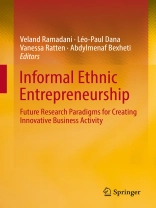This book presents a curated collection of research on ethnic entrepreneurship, focusing on the informal sector. The common theme of the expert contributions is that entrepreneurial motivation to start informal business is paramount to ethnic groups. In particular, the book explores the factors influencing ethnic groups to start informal businesses and how this creates innovative business activity. It also charts the evolution of ethnic entrepreneurship and informal businesses in advanced and emerging economies; the diversity of entrepreneurial strategies; the economics of co-ethnic employment; and the issues surrounding immigrant entrepreneurship. The book is a valuable resource for researchers in the field of informal ethnic entrepreneurship, as well as for policy makers and entrepreneurs.
Содержание
Informal Ethnic Entrepreneurship: An Overview.- Liabilities and Benefits Associated with the Involvement of Undocumented Immigrants in Informal Entrepreneurship in the United States.- Entrepreneurial Practices in an Age of Super-Diversity: A Study of Ukrainian Entrepreneurs in the UK.- The Confluence of Religion and Ethnic Entrepreneurship in the Informal Economy.- The Resurgence of Bazaar Entrepreneurship: ‘Ravabet-Networking’ and the Case of the Persian Carpet Trade.- A Study of Enterprise in Rankin Inlet, Nunavut: Where Subsistence Self-Employment Meets Formal Entrepreneurship.- Informal Cross Border Women Entrepreneurship in West Africa: Opportunities and Challenges.- Willing or Survival? Informal Ethnic Entrepreneurship among Serbs in Kosovo.- Entrepreneurship in Bolivia: An Ethnographic Enquiry.- Ethnic Enterprise Informality and Entrepreneurship in a Minority-Majority Region in the United States: Latinos in South Texas.- Informal Institutional Domains and Informal Entrepreneurship: Insights from the Nigerian Movie Industry.- Exploring the Contributions of Informal Ethnic Entrepreneurship to Economic Development in Nigeria.- Creative Entrepreneurship of Young Roma Women: An Exploratory Study from Zrenjanin and Novi Bečej, Serbia.- Why Do Migrant Women Entrepreneurs Enter the Informal Economy? Evidence from Israel.- Informal Refugee Entrepreneurship: Narratives of Economic Empowerment.- Traditional Fishing Activity, Customary Exchanges and the Vision of Informality in New Caledonia.- Explaining Ethnic Minority Immigrant Women’s Motivation for Informal Entrepreneurship: An Institutional Incongruence Perspective.- Being an (in)formal Afro-descendant Entrepreneur in Medellín, Colombia: A Case Study.
Об авторе
Veland Ramadani is an Associate Professor at South-East European University, Republic of Macedonia, where he teaches both undergraduate and postgraduate courses in entrepreneurship and small business management. His research interests include entrepreneurship, small business management and family businesses. Dr. Ramadani is an Associate Editor of International Journal of Entrepreneurship and Small Business (IJESB). He was engaged by The President of Republic of Macedonia, as a member of experts’ committee to analyse the economical, technological and juridical conditions for establishing techno-parks in the Republic of Macedonia. He also realized different training programmes with the heads of departments in Ministry of Economy. Recently, he was appointed as member of Supervisory Board of Macedonian Bank for Development Promotion. Dr. Ramadani received the Award for Excellence 2016 – Outstanding Paper by Emerald Group Publishing (Journal of Enterprising Communities:People and Places in the Global Economy). His last book is Entrepreneurship in Former Yugoslavia, published by Springer.
Léo Paul Dana, a graduate of Mc Gill University and of HEC Montreal, is Professor at Montpellier Business School and a member of the Entrepreneurship & Innovation chair, which is part of Lab Ex Entrepreneurship (University of Montpellier, France). This “laboratory of excellence” is funded by the French government in recognition of high-level research initiatives in the human and natural sciences (Lab Ex Entreprendre, ANR-10-Lab Ex-11-01). He has published extensively in a variety of leading journals including the British Food Journal, Cornell Quarterly, Entrepreneurship & Regional Development, Entrepreneurship: Theory & Practice, International Small Business Journal, Journal of Small Business Management, the Journal of World Business, and Small Business Economics.
Vanessa Ratten is an Associate Professor(Entrepreneurship and Innovation) at La Trobe Business School, La Trobe University. She is the Discipline Coordinator of Entrepreneurship and Innovation at La Trobe Business School. She teaches both undergraduate, postgraduate and executive education courses on entrepreneurship, innovation, sport innovation, management and marketing for sustainable value creation and entrepreneurial business planning. Her main research areas include entrepreneurship (especially sport entrepreneurship, developing country entrepreneurship and international entrepreneurship) and innovation (focusing on technological innovation, cloud computing, mobile commerce).
Abdylmenaf Bexheti is the Full Professor of Public Finance and Macroeconomics at Faculty of Business and Economics, South East European University, FYR of Macedonia. During the period 1996-1998, Dr. Bexheti has been a Minister for Development and then a Minister for Transport and Communication in The Government of Republic of Macedonia. He is also member of Macedonian Academy of Science and Arts. He is a member of the editorial and reviewer boards of several international journals.












